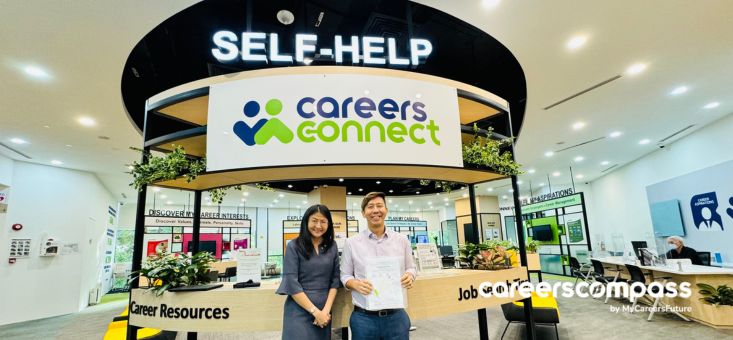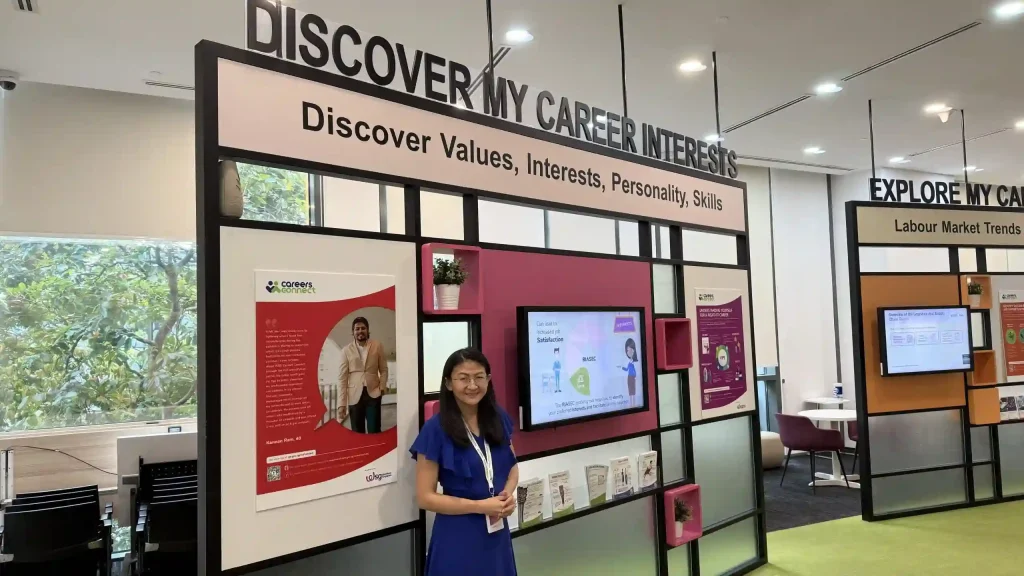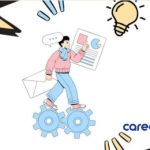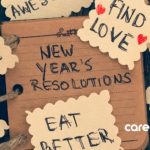Listen Here!
If you haven’t heard about Polaris, here’s a quick rundown: It’s a suite of personalised career guidance programmes delivered by Workforce Singapore (WSG) and its appointed providers, Ingeus and AKG.
It is designed for those who are:
- Exploring career opportunities;
- Seeking clarity before making crucial career decisions;
- Looking to move up in their career; and
- Contemplating to hone their expertise in a specific role.
Over the course of two to three months (or less, if you’re a quick study), you will receive personalised support from a certified career coach who will work with you to craft your career development plan, tailored exclusively to fuel your professional growth, factoring in your strengths, values and aspirations.
Many Singaporeans feel the need for further career learning and development. According to Randstad’s WorkMonitor 2022 report, 87% of Singaporeans want to speak to a career coach to make meaningful decisions about their careers.
For many of the industries that we work in, the economic and technological changes in the business landscape will definitely impact our career outlooks.
As such, it is important to roadmap our future career progression, keeping in mind our personal and professional aspirations.
But of course, as the saying goes: “The journey of a thousand miles begins with a single step”.
For some, like this commenter on a Reddit thread entitled “Should I or Shouldn’t I Engage a Career Coach”, they question the value of one-to-one sessions with a career coach, and whether these sessions truly offer significant benefit (Polaris by Workforce Singapore is available for a nominal fee of $90, subject to GST, if you’re wondering).
While different commentators on the thread have varying opinions, one commenter summed it up best: “One thing I would add, though, is that sometimes, it’s just useful to have a conversation with a real person about your job search (or career planning).
“That’s it. That human interaction to let you feel that you’re not alone and allow you to talk about your experience would be highly beneficial for your mental health during prolonged job searches (as well) .”
That’s how the writer for this article recently found himself sitting with a career coach after work on one weekday evening. Here’s how his experience has been so far!
Meet Kelvin Tan, middle-aged salaryman
First and foremost, to be upfront: I am an employee of Workforce Singapore.
While some may say that my job gives me an insider’s route to this programme, the fact is sheer inertia and complacency is the reason why it took me till my third year of employment at the agency to even consider going for career coaching myself in the first place!
Here’s a quick roundup of my resume:
- I started as a rookie journalist when I was 26.
- I slowly rose through the ranks, working as a subeditor and as an assistant editor over time in my 20s and early-30s, and finally making editor in my mid-30s, managing a team of journalists and designers for a magazine.
- In my 40s, I then moved from the publishing side of business to the content marketing side of things, joining an multi-national corporation to work on their corporate website, and then, most recently, joining Workforce Singapore to work on content, such as articles like these, and podcasts (which you can listen to here!)
Truth is, I’ve been doing the same thing career-wise for the last twenty years. I’ve been in my comfort zone for so long that it never even crossed my mind until the advent of ChatGPT last year that my job could one day be replaced by artificial intelligence and technology.
Of course, recent years have shown otherwise. After some reflection, I realised that while my career wasn’t quite in decline, it made sense to start thinking about the future a little more and plan for what’s next professionally.
The question then is: What to do next? Should I take new courses to upgrade myself? Did I want to stay in the content business or branch out to new career paths?
That’s how I found myself in a room with a career coach named Joey.
Meet Joey, career coach
Joey is a career coach with Careers Connect at Workforce Singapore. For some context, Careers Connect provides career coaching and career advisory to Singaporeans at various stages of their career path.
She has coached more than 1000 clients and clocked over 1000 coaching hours to date, achieved the following coaching credentials:
- Advanced Certificate in Career Development Facilitation (ACCDF)
- Job and Career Transition Coach (JCTC)
- Job and Career Development Coach (JCDC)
- Points of You (Level 1)
- Workplace Big Five Certified
Understanding myself as both an employee and person
Before I met Joey, I was asked to take a short five-minute quiz called the “Career Health Check.” This quiz was designed to give me an idea of where I was currently in my career, and help customise the support I would get during the process.
It was quite simple and comprised several questions that helped describe my career circumstances and also my current state of mind regarding my professional outlook.
Just to share the broad strokes of what the programme is like: it consists of three sessions to be completed within three months, though generally, most tend to do so within 4-6 weeks, being spaced out over two weeks each for participants to take time to reflect and also do some “homework” in between.
When I reached the Careers Connect centre at the Lifelong Learning Institute, it was pretty late evening — I think I might have been Joey’s last appointment for the day!
Thankfully, the programme has timeslots available up to 5-7 pm on weekdays and Saturday mornings from 9 am-1 pm, which makes it suitable for those who are currently employed but still want to get some career planning guidance.
I sat down with Joey at her office after some pleasantries, and we got to work (pun intended). She quickly ran through some of the insights that came up from the quiz I had taken before the session, with some interesting findings I hadn’t even realised about myself.
There are five main elements that the quiz is designed to help us discover about ourselves:
- Confidence
- Curiosity
- Control
- Concern
- Cooperation
Joey shared that the structure was developed with career theorists to help showcase the mindset of the individual, which is important before starting career coaching. This also identifies if we have a good balance of the five elements, saying it was “similar to real-world health vitals, like blood pressure readings”, from a career standpoint.
Based on my results, the quiz found that I was doing fairly well in terms of being actively concerned about where my career currently is and also confident in what I was doing. However, it also showed that I was not particularly good at cooperating with others or working on tasks that required team consensus.
Joey probed further, and I realized this was probably true. I shared how even as a parent (my kid is an 11-year-old boy), I’ve always been the “bad cop,” inclined to be more fixated on the rules and what was good and right for him rather than his feelings.
Professionally, I’ve also always been more strategic rather than group-think-minded, which also affects my comfort levels in different work environments and working for different types of employers and bosses.
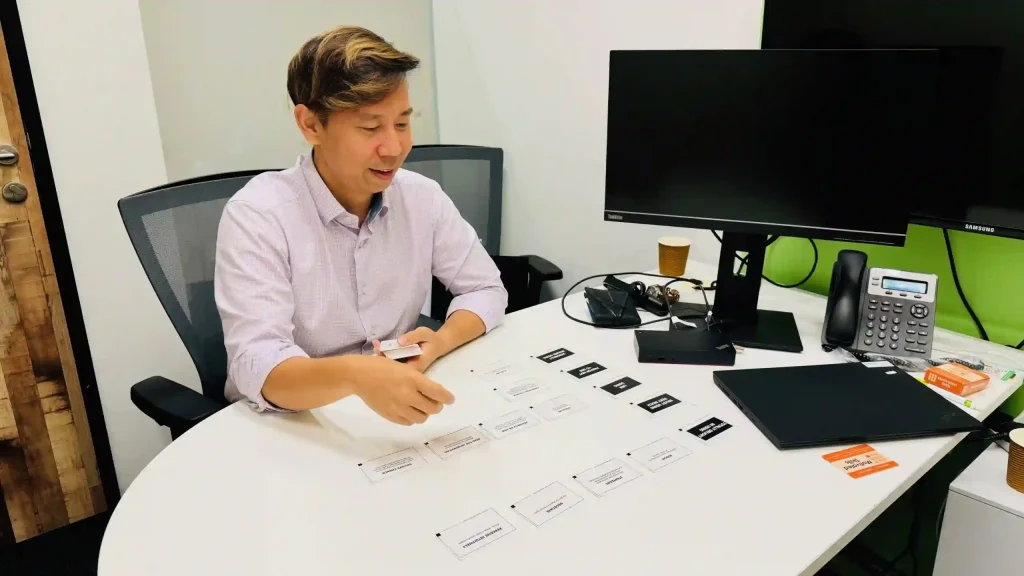
Mapping out my career
Next, Joey had me fill out a “Career Flow Map”, which is designed to help me recognise my career trends, patterns, and factors that have influenced my job satisfaction previously.
As the saying goes: “Those who fail to learn their history are doomed to repeat it.” These insights are designed to help me set my preliminary goals and work towards making better and more well-informed career choices by comparing my current and last two jobs.
We then look at two key factors at my current and last two employers (which were a logistics multi-national corporation and a business news publisher):
- What were/are the challenges faced due to what’s required at the job. E.g. responsibilities, tasks assigned, expectations from supervisors
- What was the availability of resources, and my capabilities to do the job well. E.g. knowledge, skills, attributes, availability of training to carry out the job
This comparison, Joey explained, showed which roles I was ‘in the flow’: “where the level of challenges and my skillsets matched best”. This helped clarify what sort of career decisions I should make moving forward, and what roles would best suit me, rather than just chasing jobs based on what I perceived to be important without further reflection.
Using the insights of the ‘Career Flow Map’, we then mapped out my various skills and how they correlated to my personal interests and values.
As she astutely pointed out, it made no sense for me to be in roles where I could do the job perfectly fine but utterly hated what I’d be doing (e.g. anything involving Microsoft Excel or PowerPoint).
“There’s just no sustainability to that, only burnout,” she added.
In her experience, she shared that based on the clients she has seen recently, 70-80% of them are burnt out for similar reasons, and her career coaching with them is really to help them figure out how far they are from actually having the right job that suits their skills and personality.
As we ended the first session, it became clear that my personal career objective is about building greater job security, even if I’m currently employed in a role that seems stable and suits me.
Given the advent of artificial intelligence and tools such as ChatGPT, I’m going to need new skills and build a new mindset to stay relevant in my field.
Stay tuned to my second session with Joey to see what new insights I will learn, what the science says I’m good at, and what skills I should pick up for career sustainability and planning!
Note: The writer is a Principal Manager at Workforce Singapore and received complimentary access to the Polaris career guidance programme for the purposes of this article. Polaris by WSG is available to the public for a nominal fee of $90 (subject to GST).


